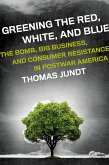In popular imagination, environmentalism is often linked to Rachel Carson's
Silent Spring and the political activism of the 1960s and '70s that moved increasing numbers of Americans to insist on a better quality of life-open spaces, clean air and water, beautification campaigns. But these interpretations have obscured the significant origins of environmentalism as a moral and intellectual broadside against the growing power of corporate capitalism, both domestically and in the postwar liberal international order the United States was enacting abroad. In
Greening the Red, White, and Blue, Thomas Jundt shows how many Americans came to view powerful corporations and a federal government bent on economic growth as threats to human health and the environment. Fallout from atomic testing, air and water pollution, the proliferation of pesticides and herbicides-all connected to the growing dominance of technology and corporate capitalism in American life-led a variety of constituencies to seek solutions in what came to be known as environmentalism. In addition to political and legal campaigns to effect change, an alternative form of civic participation emerged beginning in the late-1940s as growing numbers of citizens turned to what they deemed environmentally friendly consumption practices. The goal of this politically charged consumption was not only to protect themselves and their families from harm, but also to achieve social change at a time when many believed the government was placing the desires of business before the needs of its citizens. Politicians responded to the growing environmental concerns of middle class Americans, but, in the end, continual political compromises with corporate power meant weak laws and lax enforcement. Many citizens sought refuge in an alternative "green" marketplace-including organic foods, natural-fiber clothing, alternative energy, and everyday products designed to have minimal environmental impact. In doing so, they attempted to create a community for those who shared their concerns and frustrations, as well as their vision for a different American Way. Thomas Jundt's work highlights the intertwining of consumerism and environmentalism amidst the growing power of corporate capitalism and government in postwar America.
Dieser Download kann aus rechtlichen Gründen nur mit Rechnungsadresse in A, B, BG, CY, CZ, D, DK, EW, E, FIN, F, GR, HR, H, IRL, I, LT, L, LR, M, NL, PL, P, R, S, SLO, SK ausgeliefert werden.









